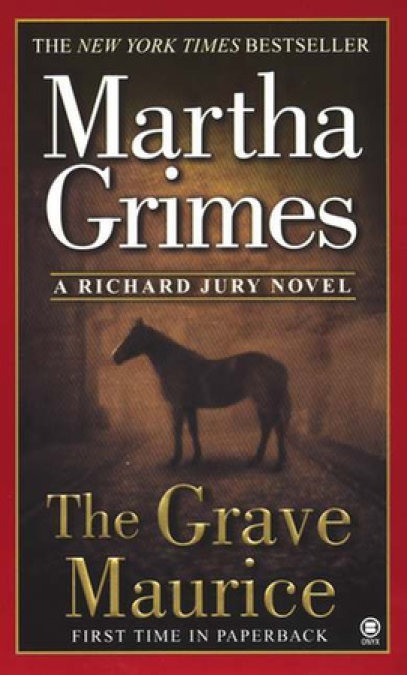The Grave Maurice • Copyright 2003 by Martha Grimes • 0-451-41101-3 • Onyx
Melrose Plant looked around the rather grim environs of the Grave Maurice and wondered if it was patronized by the staff of the Royal College of Surgeons up the street. Apparently it did serve as some sort of stopping-off point for them, for Melrose recognized one of the doctors standing at the farther end of the long bar.
As Melrose stood there inside the door, the doctor emptied his half-pint, gathered up his coat and turned to leave. He passed Melrose on his way out of the pub and gave him a distracted nod and a vague smile, as if he were trying to place him.
Melrose stepped up to the place the doctor had left, filling the vacuum. He was looking at the woman close by, one of surpassing beauty—glossy dark hair, high cheekbones, eyes whose color he couldn’t see without staring but which were large and widely spaced. She was talking to another woman, hair a darkish blond, whose back was turned to Melrose and who drank a pale drink, probably a Chardonnay, whose ubiquity, together with the wine bars that loved to serve it up, Melrose couldn’t understand. The dark-haired one was drinking stout. Good for her. The bartender, a bearded Indian, posed an indecipherably query that Melrose could only suppose was a varient of “What will it be, mate?“ The operative term was either “grog“ or “dog,“ as in “Want a bit o’ grog?“ or “Walkin’ yer dog?“ Having no dog, Melrose ordered an Old Peculiar.
The Grave Maurice had its foot in the door of “hovel-like.“ Melrose looked all around and made his assessment, pleased. For some reason, he could always appreciate a hovel; he felt quite at home. The incomprehensible barman, the patched window, the broken table leg, the streaked mirror, the clientele. The two women near him were a cut above the other customers. They were well dressed, the dark-haired one quite fashionably, in a well-cut black suit and understated jewelry. The blond one, whose profile Melrose glimpsed, appeared to know the barman (even to understand the barman) with his raffishly wound turban. After he returned, smilingly, with the refills and Melrose’s fresh drink and then took himself off, the dark-haired woman picked up their conversation again. The blonde was doing the listening.
They were talking about someone named Ryder, which immediately made Melrose prick up his ears, as this was the name of the doctor who had just departed and whom, he supposed, the one woman must have recognized. But he was rather surprised to hear him further referred to as “poor sod.“ The second woman, whose voice was distinct while at the same time being low and unobtrusive, asked the dark-haired one what she meant.
Melrose waited for the answer.
Unfortunately, the details were getting lost in the woman’s lowered voice, but he did catch the word disappeared. The dark-haired woman dipped her head to her glass and said something else that Melrose couldn’t catch.
But then he heard, “His daughter. It was in the papers.“
The blonde seemed appalled. “When was that?“
“Nearly two years ago, but it doesn’t get any—“
Melrose lost the rest of the comment.
The one who had made it shrugged slightly, not a dismissive shrug, but a weary one. Weary, perhaps, of misfortune. If she was a doctor too, Melrose could understand the weariness.
Then she said, “...brother was my...killed...“
The blonde made a sound of sympathy and said, “How awful. Did—“
If only they’d stop talking clearly on the one hand and whispering on the other! Melrose, who kept telling himself he couldn’t help overhearing this conversation, could, of course, have taken his beer to a table, and he supposed he would if his presence so close beside them got to be a little too noticeable. But he wanted to hear whatever he could about this doctor’s daughter—it sounded fascinating. He thought the phrase poor sod suggested some unhappy tale and he was always up for one of those. Sort of thing that makes you glad you’re you and not them. How morbid.
He then heard something about insurance and the dark-haired woman was going on about South America and warmer climate.
She appeared to be planning a trip. He didn’t care about this; he wanted to hear more about the person who had disappeared. The blonde occasionally turned to retrieve her cigarette, and then Melrose could pick up the drift.
“—this doctor’s daughter?“
The woman facing Melrose nodded. “So it never ends for him...closure.“
“I hate that word,“ said the blonde, with a little laugh.
(Melrose was ready to marry her on the spot. Inwardly, he applauded. He hated the word too.)
“All it means is that something’s unended, unfinished. Why not just say that?“
The blonde was not in the mood for a semantic argument. “There never is, anyway,“ she said, slipping from the stool.
“What?“ The dark-haired woman was puzzled.
“Closure. Everything remains unfinished.“
The dark-haired woman sighed. “Perhaps. Poor Roger.“
Roger Ryder, thought Melrose. When the blonde caught Melrose looking and listening she gave him a rueful half smile. He pretended not to notice, though it would be difficult not to notice that mouth, that hair. Melrose paid for his beer and slid off the stool.
His daughter. Two years ago something had happened to her, and it hadn’t been death. Death would have closed it. The girl had disappeared. Had something happened in South America? No, he thought, that must be another story altogether. On the other hand, Ryder’s daughter disappearance—that had been in the papers. But Melrose wouldn’t have to search the Times.
Roger Ryder was Richard Jury’s surgeon.
We hope you are enjoying the book so far. To continue reading...
Copyright © 2026 All Rights Reserved
